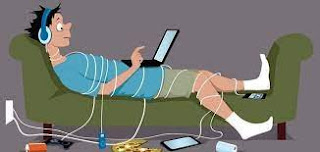Growing up in the fast paced world of technology has taught me a lot about not only myself, but how dependent society is upon the digital world. When I go out in public, it is shocking to look around and see how many people are completely consumed by their phones, not paying attention to anything going on around them. However, I too am guilty of this. Technology affects almost every aspect of our lives. It has presented society with outlets to access immediate information, instant communication world-wide, forms of transportation, socializing platforms and applications, and so much more. While there are a number of benefits that technology has brought us all, there are also many downsides as well.
Personally, I believe I am guilty for leaving a large digital footprint. Along with most of society, I am probably too lenient on technology given I use my phone for pretty much everything. For example, it is my alarm clock every morning. I also use it daily for navigation purposes such as Apple Maps, Google Maps, etc. Along with using it to check my email, messages, and my social media notifications. Technology controls our lives whether we want to admit it or not and without it, we would be clueless.
For me, I would say I spend most of my time on technology and the internet. Whether that
be on my laptop doing school work, to communicate with friends and family, or even just for entertainment purposes, technology consumes my day to day life and activities as it does most people my age. Technology addiction is a very real thing that most of society has without even realizing. Since the emergence of the internet and smartphones, research is showing an increase in the number of people struggling with an addiction to technology. It is not uncommon for both youth and adults to feel a need to constantly be "plugged in" to social media and the internet, but this often leads to a fear of missing out, and a fear of being left out for the younger generation which I can personally relate to.
What has hooked me the most when it comes to the use of technology is social media. It is an addiction that seems almost impossible to overcome. Social media is an endless competition between people my age to see who "has the best life". Everyone knows that what you see on social media is almost never genuine. So why is it that my generation continues to post content that is so fake? Unfortunately, it is because the feedback to your posts (such as comments, likes, shares, etc.) are what keeps the addiction going. According to healthline, while social media can see mindless and fun, it actually has a significant effect on your brain. Whenever you log onto your favorite apps, dopamine signals in your brain increase. When you experience more dopamine after using social media, your brain identifies this activity as a rewarding one that you ought to repeat. Such a reaction may be more felt whenever you make a post of your own and gain positive feedback. I did not think my use of technology was a lot until I looked at my screen time in the settings application on my phone. Globally, people average 6 hours and 58 minutes of screen time per day. Daily screen time has increased by nearly 50 minutes per day since 2013 and the average American spends 7 hours and 4 minutes looking at a screen every single day. My daily screen time average falls around this with 5 hours and 33
minutes. Today alone I picked up my phone 216 times. It is shocking that I have only been awake for around 7 hours and I have spent 5 of those hours consumed by my phone and the digital world.
I watched a TED Talk by Sherry Turkle entitled, "Connected, but alone?" that coincides with this perfectly. In her Ted Talk, she was addressing any and all people that use technology and the internet. However, she is particularly targeting the younger generation because we are the ones that have grown up and are still growing up with so many technological advancements and improvements. Although her Ted Talk was given in February of 2012, it seems to be more relevant today than it was 10 years ago. We turn to technology to connect us in ways that we can comfortably control. Sherry Turkle describes this concept as the goldilocks effect. She states that “people can't get enough of each other when they are at a distance and can control the amount they see each other”. Technology has changed the way we connect and the amount we do. We expect technology to make connecting easier for us but is it really just hurting us? Is it impacting our ability of human interaction and capability for engaging with others in person instead of through a screen? We rely on technology more than we rely on each other. We depend on it to comfort us, to connect us, and to keep us company, when really, these are things we should be relying on others and ourselves for.





Comments
Post a Comment